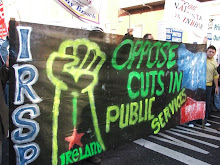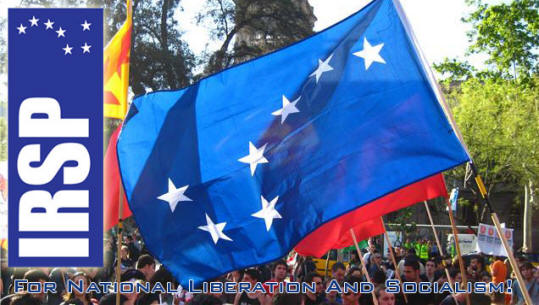This year, 2009, is the 96th anniversary of the 1913 Dublin Lockout. The lockout started at the Dublin United Tramways Company owned by William Martin Murphy, an Irish Nationalist MP. Murphy was also head of the Employers Federation (forerunner of todays IBEC) which represented 400 employers. In oppossition to Murphy and his draconian rules were the Irish Transport and General Workers Union led by Jim Larkin and James Connolly along with 36 other trade unions. The strike was initially about the rights of workers to be members of a trade union of their choice. Murphy refused to recognise the ITGWU and tried to force workers to sign a form denouncing this union or face dismissal. Other employers folluwed suit and locked out their workers.
Today in 2009 we see another employers offensive this time on the docks in Dublin. The employers, Peel Ports Group, are trying to force redundancies, not only in Dublin but also Belfast, and new contracts which include "pay cuts and worse working conditions". If the company is successful in their quest it will have serious repercusions for workers across the island of Ireland. The workers on the docks have held out for several weeks and have held a series of marches and rallies. On Monday 24th August 2009 a march left East Wall Road and East Link Bridge meeting up and converging on the Marine Terminal Depot. Around 800 dock workers, supported by their communities, along with trade unionists from several unions, the Independent Workers Union, SIPTU, Unite, the International Transport Workers Federation along with political activists from the Socialist Workers Party, the Socialist Party, the IRSP, Sinn Fein , the Communist Party of Ireland, Eirigi and various sympathetic individualls. Messages of support were read out from dockers across Europe where several ships have been prevented from leaving port by the International Transport Workers Federation. On arrival at the terminal the rally was addressed by several speakers including Peter Bunting ICTU (Northern Division), speakers from ICTU and various other trade unionists including a representative from Rotterdam, Holland, representing Dutch dock workers. The centre of many attacks were the scabs who have been imported from Belfast and perhaps the most hard hitting assault on these lowest forms of life came from a North of Irish trade unionist, Kevin Doherty. He described these peaople as "shameless" and informed them that "they are not welcome in their communities or anywhere else" he said they "should hang their heads in shame". The scabs continued to operate the terminals at the plant, echoes of Captain Boycott using scab labour in Co. Mayo in the late 19th century. After the speeches the demonstrators invaded an area of the port itself but unfortunately could not get to the scabs. A strong security presence was in evidence against working people fighting for their livelyhoods evidence of what this state is really all about, defending capital. The signitories of 1916 must turn in their grave at what is going on today in their name. This is not the kind of society those men and women were fighting for.
It is wildely reported that some of the strong arm security personell used by Peel Ports Group are former SAS people, obviously trained to a far higher degree of violence than your average security man. If these reports are true it suggests a serious shift in aggression by the employers and spells danger for all of us. If the employers are successful in their quest at destroying resistance on the docks the domino affect will undoubtedly be seen and felt by workers right across the island of Ireland in the months and years to come.
We would urge all workers, trade unionists and those down trodden employees who are forbidden from union membership by their employers, to send messages of support to the Dockers of Dublin and those who have been made redundant in Belfast in many ways thanks to the precedent set by their fellow towns people and other scabs.
Kevin Morley Branch Secretary IRSP Dublin.
Wednesday, August 26, 2009
Subscribe to:
Posts (Atom)


